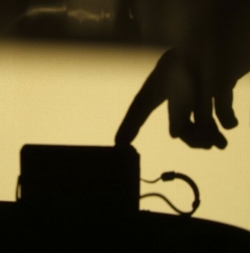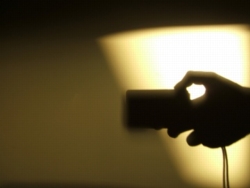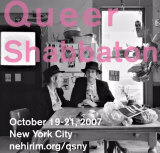 May 07
May 07
Shadow Play
Amir Gutfreund
Translated by Jessica Cohen
|
A Note from the Editor Like “Shadow Play,” all eleven stories in Silhouettes deal with mental illness. The collection appeared as a project of Enosh, the Israeli Mental Health Association, and featured some of Israel’s most engaging writers. All proceeds from the volume were donated by the authors and the publisher to Enosh. Since 1978, the organization’s professionals and volunteers have made rehabilitation services, housing, workshops, social clubs, and sporting and entertainment activities available to the mentally ill throughout Israel. -Adam Rovner, Hebrew Translations Editor |

On summer evenings, Uncle Nathan used to put on shadow plays. With nothing but ten fingers and a beam of light against a plain white wall, he astounded us with lions and monkeys, alligators and train engines. All eyes watched, riveted, when the silhouette magic began. He didn’t ask for much – a wall, a light. In the back rows of wedding halls, or when holiday dinners were winding down, his fans would gather to marvel: a butterfly, an antelope, Theodor Herzl, a turtle.
In between shows, Uncle Nathan was a dutiful clerk at the VAT office. He was not bitter that life had led him to this – a narrow room, a desk, forms piled high. “You see, it was here on this wall that it all began,” he would say, pointing to the plaster wall opposite his desk and drifting away into sweet remembrance. The wall was bare, with no pictures or windows. Only the roving silhouette of Uncle Nathan’s finger, no longer merely pointing now, but capering – a seahorse, a ballerina, a fighter plane.
As Uncle Nathan chuckled, his eyes aglow, his interlocutor would abandon any notion of pitying this man hunched over a broken desk squeezed between a door and a file cabinet. It was a miserable alcove, sliced out of a larger office. The partition had been ordered years before – six clerks on one side to help customers, and Uncle Nathan on the other with a broken ventilator wedged into the wall above his head.
“But it’s all right. Without this wall, where would I be?” And a jubilation of fingers would dance recklessly on the wall as Uncle Nathan astonished his guest: a shark, a tractor, a magician, a paratrooper.

On summer evenings, we gathered in the yard with our eyes glued to the outer wall of the building, waiting for Uncle Nathan. Neighbors brought chairs, knitting, and transistor radios. They collapsed in their seats and sat there sleepily, their eyelids drooping. High above, Uncle Nathan would zigzag his hands back and forth to cast his creations upon the wall – a hedgehog, a chariot, Ben-Gurion, a cannon. From year to year, the spectacles grew more involved – a prince, a pomegranate, dancing butterflies, an acrobat.
When Uncle Nathan was pensioned off with a partial severance package, he said, “It’s all right,” and for a long time he withdrew into his little ground-floor apartment, unseen and unheard. Since he lived alone, no one knew what went on between his four walls, but at night, through the slits of the perpetually drawn window blinds, one could detect the beam of a flashlight shining on the white wall inside.
When summer came he debuted his new shows, but there were no more lions or monkeys or train engines.
“Guess!” Uncle Nathan shouted, spurring us on. He looked a bit peculiar, a little stooped. He wore a long-sleeved shirt. “Guess! Guess!”
When our guesses died down he patiently explained, “It’s Stelmakh scoring his famous goal – the moment of impact as he headbutts the ball past the great Lev Yashin!”
And indeed, a comparison with the black-and-white photograph immortalizing Israel’s goal against Russia revealed a magnanimous imagination and a depiction of even miniscule details. Every single finger, and thumbs too, came together to represent the legendary scene.
“Now guess this one!”
Shadows wove swiftly together. No one could guess.
“Come on, it’s the paratroopers standing in front of the Kotel. Can’t you see?”
“Do a train engine!” someone called out from the darkness.
But Uncle Nathan persisted. His face was radiant with the love of his craft. He juggled his fingers. “Here’s Sarah Aaronsohn, hero of the Nili underground, committing suicide. And this is Operation Entebbe, just as the first Hercules lands at the airport. Now let’s see if you can guess this one!”
When we sat shiva for Grandpa Mendel at Danny’s place, Uncle Nathan did Mordechai Spiegler scoring his World Cup goal.
“Not now, it’s not right,” someone murmured, and a roomful of pent-up emotions offered quiet yet heated consent.
But Uncle Nathan went on. “Here’s 1977, President Sadat stepping off the plane at Lod Airport. And this is 1978, A-ba-ni-bi winning the Eurovision Song Contest. The encore. And now, the three-way handshake at the Camp David peace accords.”
At Oren’s bris he did Eloise kissing Abelard. Uncle Menachem said, “Goyishe stuff. Not appropriate,” and a hum of agreement went through the room. It was enough. This had to stop.
“Okay, if you don’t want it, that’s fine,” Uncle Nathan said meekly. He smiled. Then he sat down between Avner and Sima and leaned back quietly.
No one noticed that he wasn’t at Galia’s wedding. He came to Avraham Kimel-Strusman’s shiva, but only sat near the table, slack-jawed, and stared at the pretzels and juice and the stack of yarmulkes.
He was absent from the Passover seder. On Shavuot the whole family gathered at Aunt Perla’s for blintzes, cheesecake, and a blank wall. Without Uncle Nathan.
The blinds in his apartment were always drawn. I hoped he was getting ready for summer, but at nights I saw no light through the slats.
When summer began, they came to tell Aunt Perla that Uncle Nathan was hospitalized. In a mental institution. Everyone wanted to know what had happened, and Aunt Perla said, “a breakdown.”
An embarrassed trickle of guests proceeded to visit him. People sat and talked. Brought him soft pretzels, juice, pocket money. Tried to cheer him up. “Won’t you do a monkey? Or a lion? Paratroopers at the Kotel?” They gave him frightened looks.
When we left the hospital we stood in the sunny parking lot. Uncle Yitzhak’s Bella wanted to know if what had happened to Uncle Nathan ran in the family. “Is it genetic? Because I’ve heard they had other cases.”
“Well, Nathan is not exactly family,” said Uncle Menachem and looked at everyone.
I looked back at him. “I thought he and Aunt Perla were family,” I said.
They got angry at me. “What are you talking about? Don’t interfere.”
Then Uncle Menachem recounted how he had met Nathan after the war, in Poland. He was a stranger, not-family, taken in out of pity because he had lost everything. Uncle Menachem didn’t look at me while he talked, but at Bella. And at everyone else.
Danny said, “We always treated him like family. How could this have happened? Poor man…”
They kept visiting him every once in a while to spend the odd twenty minutes by his silent side, even though he was not-family. But he was slowly forgotten. How long can you sit next to someone who doesn’t even say hello?
We neighborhood kids gathered at Uncle Nathan’s wall. We tried – a train engine, an alligator. But we sensed that the magic was far away, sitting on a chair in a hospital room without talking to anyone.
Aunt Perla visited Uncle Nathan every two weeks. She said he was doing well, that he was quiet, that he’d even become a little religious in the hospital, but not too much. No one took him home for the holidays, but they said he’d made some friends in the institution. That’s nice, everyone said. Eventually Aunt Perla said this couldn’t go on any longer. After all, we were like family, and we had to have him over. No one argued. She was free to invite him. Everyone came to the dinner she hosted, just a little something on Saturday evening after Shabbat.










